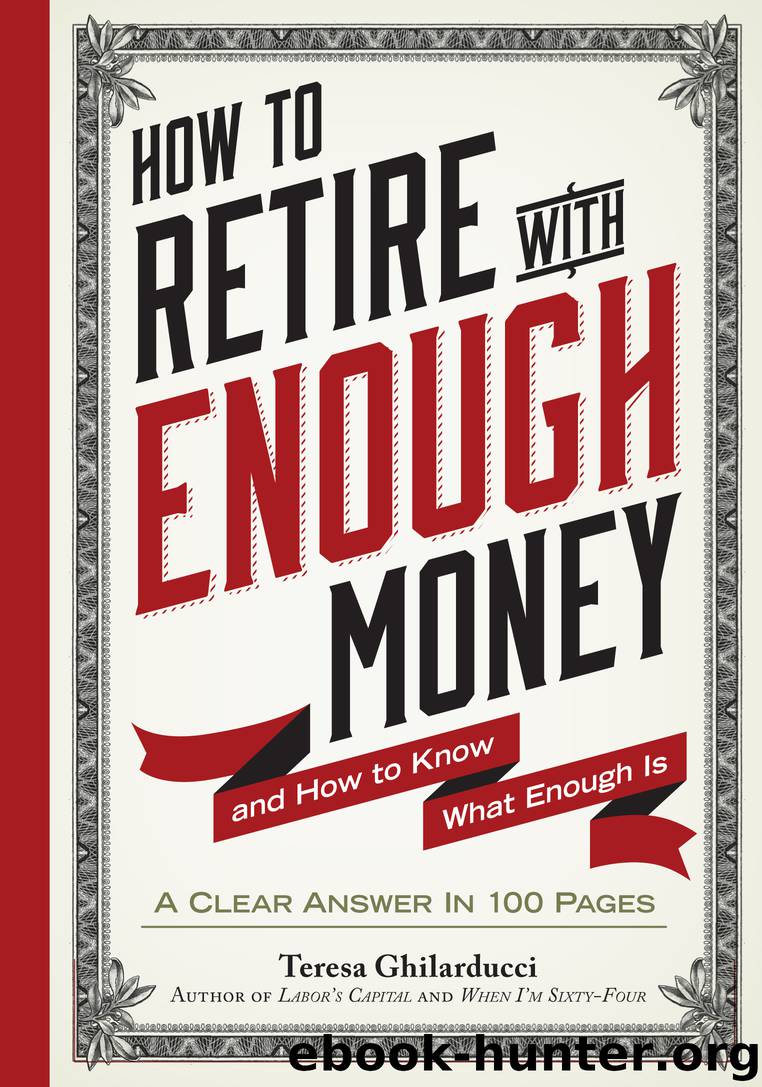How to Retire with Enough Money by Teresa Ghilarducci

Author:Teresa Ghilarducci
Language: eng
Format: epub
Publisher: Workman Publishing Company
Published: 2015-10-19T19:13:13+00:00
Yet more good ideas. There’s no single magic bullet; saving is a combination of many small efforts. The following ten propositions are based on sound economic research.
1. Keep a budget and record everything that you buy. The first step in getting control of your spending is just being aware of it. This simple act of focusing your attention on where your money is going tends to reduce spending by 15 percent.
2. Don’t carry an ongoing balance on your credit card. Too many people use credit cards as quick cash for everyday purchases, and about 50 percent of them carry a balance from month to month, incurring interest charges. It’s better to carry a debit card with a credit-card function. It will carry a balance, but only for a month, at which point you have to pay it off. Your actual credit card should stay at home in a hard-to-reach place. It’ll be there in case of a true emergency.
3. Watch less television. What? Isn’t television low-cost entertainment, and isn’t anything low cost good for a frugal lifestyle? The point here is that TV has an insidious hidden cost: the cost of things you’ll probably buy if you’re a frequent viewer. The reason for this extra spending is twofold. First, TV watchers are exposed to commercials, which we like to think we’re ignoring but that are crafted by experts to linger in our minds and urge us to buy. Second, rich characters are overrepresented on television shows, and even the working-class ones have great apartments, expensive haircuts, and stylish clothes. It skews our ideas of what’s realistic and attainable. Watching less television is like turning down the volume on an endless appeal to spend.
4. Rethink life insurance. If you don’t have kids, you almost certainly don’t need it. But if you do have life insurance, make sure it’s term, not whole. Term life insurance is insurance pure and simple: You pay premiums and get a lump sum if the insured dies. Whole life insurance has an increasing value that the insured can cash out or borrow from; it’s an insurance policy that also acts as an investment. Unfortunately, it’s not a good investment, because the product is inflexible and the fees are high. If you’ve ever tried that peanut butter and jelly that comes in the same jar, and didn’t care for it—well, this is pretty much the same. Insurance and investments work better when they’re two separate things.
5. Speaking of insurance, raise the deductible on every policy you have; that will reduce your monthly premiums. The deductible is the amount of money you have to pay on a loss before your insurance company steps in and pays the rest. If you agree to pay a higher share, you get a lower monthly premium. For example, if you raise your home-insurance deductible from $500 to $1,000, you can save almost 25 percent on your premium. This works similarly for auto and health insurance. Bottom line: Insurance is there so that a huge misfortune won’t wipe you out financially; that’s clearly worthwhile.
Download
This site does not store any files on its server. We only index and link to content provided by other sites. Please contact the content providers to delete copyright contents if any and email us, we'll remove relevant links or contents immediately.
The Secret History by Donna Tartt(16627)
The Social Justice Warrior Handbook by Lisa De Pasquale(11489)
Thirteen Reasons Why by Jay Asher(7788)
This Is How You Lose Her by Junot Diaz(5775)
Weapons of Math Destruction by Cathy O'Neil(5038)
Zero to One by Peter Thiel(4824)
The Myth of the Strong Leader by Archie Brown(4789)
Promise Me, Dad by Joe Biden(4449)
Beartown by Fredrik Backman(4420)
Stone's Rules by Roger Stone(4417)
How Democracies Die by Steven Levitsky & Daniel Ziblatt(4399)
The Fire Next Time by James Baldwin(4343)
100 Deadly Skills by Clint Emerson(4079)
A Higher Loyalty: Truth, Lies, and Leadership by James Comey(4033)
Rise and Kill First by Ronen Bergman(4012)
The David Icke Guide to the Global Conspiracy (and how to end it) by David Icke(3883)
The Farm by Tom Rob Smith(3872)
Secrecy World by Jake Bernstein(3783)
The Doomsday Machine by Daniel Ellsberg(3732)
